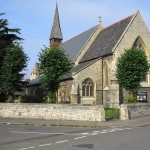 S. Andrew’s was founded to celebrate the fullness of Catholic faith and practice within the Church of England. The Church of England did not come into existence at the Reformation in the 16th century: the Reformation was just that – a reform of the existing Church. The present Archbishop of Canterbury, therefore, is styled as the 103rd since St. Augustine. No new church was ‘created’: there was a breach with Rome but the Church in England continued.
S. Andrew’s was founded to celebrate the fullness of Catholic faith and practice within the Church of England. The Church of England did not come into existence at the Reformation in the 16th century: the Reformation was just that – a reform of the existing Church. The present Archbishop of Canterbury, therefore, is styled as the 103rd since St. Augustine. No new church was ‘created’: there was a breach with Rome but the Church in England continued.
As Catholic Christians we are inspired by the Tradition of the whole Church. We believe ourselves to be part of the Communion of Saints, to whom we turn for help and guidance. We celebrate the seven Sacraments of the Church and our worship, centred on the Mass, seeks to be truly catholic – open to all. Any who normally receive Communion in their own church are welcome to do so at our altar.
We are also part of the worldwide Anglican Communion of Churches, which is both Catholic and Reformed and comprises over 77 million members.
So we draw on two thousand years of tradition from both the Catholic West and Orthodox East, as well as our own Anglican heritage, we also believe that God speaks to us through our contemporary culture. It is this dialogue between culture and tradition in which we try to engage.
We welcome all who are seeking to be part of a living catholic tradition wanting to carry the gifts of the past into the future. Above all we try to be an open, inclusive church that reflects the way the Church of England has always sought to offer a home to all who are seeking God. As our Mission Statement says:
‘We, the people of the Parish of S. Andrew, Romford, appreciative of our rich tradition and missionary heritage, are a catholic community empowered by the Holy Spirit, the sacraments, and prayer. We strive for peace and social justice; seek to respect the whole of creation; encourage journeys of discovery; and seek to be open to all members of the community regardless of race, gender, sexual orientation, age, disability, religious or political beliefs.’






